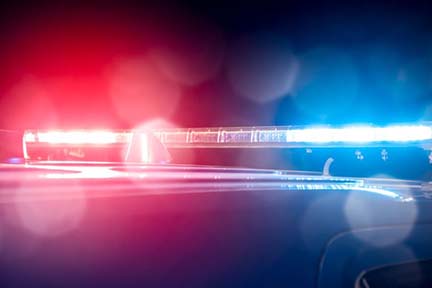
by Becky Andrus | Oct 11, 2021 | Regional News

Gov. Whitmer Announces Michigan Police Departments Awarded $1 Million to Support Officers and Public Safety Across the State
LANSING, Mich. – Building on her MI Safe Communities plan to reduce violent crime, Governor Whitmer today announced that police agencies across the state of Michigan will receive additional funding to boost public safety initiatives. The Michigan State Police (MSP) was awarded a $182,328 grant to support de-escalation training through the United States Department of Justice’s (DOJ) Community Policing Development De-Escalation Training Program, which Governor Whitmer advocated for earlier this year. The governor also announced 11 other local agencies across the state are being awarded a total of $1,025,138, supporting the governor’s goal of increasing public safety.
“I applaud the Department of Justice for investing in Michigan’s public safety by awarding our State Police and 11 local agencies across the state over $1 million in grants,” said Governor Whitmer. “Michigan’s brave troopers and law enforcement officers are at the forefront of the crucial work needed to reduce crime and keep our communities safe. Thanks to this grant, MSP is able to continue its efforts to strengthen de-escalation training to ensure police and community members alike can make it home safe at the end of each day.”
“At the core of de-escalation is communication. Our troopers and the communities we serve benefit when we improve how we approach and treat each other,” said Col. Joe Gasper, director of the MSP. “We’re grateful for the grant that will allow us to build upon the training we currently provide to our recruits and move it into the field by implementing a consistent program for all of our nearly 2,100 enforcement members.”
De-escalation training helps ease tensions during police-civilian encounters, ensuring both law enforcement and community members can communicate effectively, securing the safety of everyone involved. Training on de-escalation helps officers maintain security in situations, prevent crime, and advance community policing.
“The Michigan Association of Chiefs of Police is grateful for the efforts of our Governor to restore and provide training funds to our officers so they can better protect their communities,” said Chief Robert Stevenson, Executive Director of the Michigan Association of Chiefs of Police.
View a list of communities receiving public safety grants here:
|
|
|
|
|
|
Supporting Law Enforcement Agencies in Seeking Accreditation
|
|
Charter Township of Brownstown
|
Supporting Law Enforcement Agencies in Seeking Accreditation
|
|
|
|
Crisis Intervention Teams – Implementation of CIT
|
|
|
|
Supporting Law Enforcement Agencies in Seeking Accreditation
|
|
|
|
Supporting Law Enforcement Agencies in Seeking Accreditation
|
|
|
|
Supporting Law Enforcement Agencies in Seeking Accreditation
|
|
Charter Township of Kalamazoo
|
Supporting Law Enforcement Agencies in Seeking Accreditation
|
|
|
|
Supporting Law Enforcement Agencies in Seeking Accreditation
|
|
Match-E-Be-Nash-She-Wish Band of Pottawatomi Indians
|
Supporting Law Enforcement Agencies in Seeking Accreditation
|
|
Michigan Association of Chiefs of Police
|
Enhancing Existing Law Enforcement Accreditation Entities
|
|
Michigan Department of State Police
|
De-Escalation Law Enforcement Agency Grants
|
|
|
|
Microgrants / Community Trust and Legitimacy: Community Trust Project
|
|
|
|
|
|
To view the letter Governor Whitmer sent to U.S. Attorney General Garland in support of the Michigan State Police De-Escalation Training grant click the link below:
|

by Becky Andrus | Oct 11, 2021 | Regional News

Gov. Whitmer Proclaims October 11 as Indigenous Peoples’ Day
LANSING, Mich. – Governor Whitmer is celebrating Michigan’s Indigenous population by proclaiming October 11 as Indigenous Peoples’ Day to uplift our country’s Indigenous roots and recognize the history and contributions of Indigenous peoples.
“Today is a day of remembrance, reflection, and celebration of the Indigenous peoples, including those who call Michigan home,” said Governor Whitmer. “The success of tribal communities is inextricably linked to Michigan’s success, and we must ensure that they have an empowered voice and seat at the table. I am proud to proclaim October 11th as Indigenous Peoples’ Day and celebrate the thriving cultures and values that our tribal communities contribute to our state.”
Governor Whitmer and Lt. Governor Gilchrist are committed to working alongside tribal leaders. Last month, they hosted a summit with Michigan’s tribal leaders to address the issues important to their communities and ensure they have an empowered seat at the table as we make meaningful progress on the kitchen-table issues.
In Governor Whitmer’s first year in office, she signed Executive Directive 2019-17 which reaffirms and extends Michigan’s commitment to recognize the sovereignty and right of self-governance of Michigan’s federally-recognized Indian tribes and orders each state department and agency to adhere to these principles. It’s also the first executive directive in Michigan history to require training on tribal-state relations for all state department employees who work on matters that have direct implications for tribes. The executive directive details a process of tribal consultation designed to ensure meaningful and mutually beneficial communication and collaboration between these tribes and the departments and agencies on matters of shared concern.
Governor Whitmer has shown a deep commitment to ensuring members of Michigan’s federally recognized tribes have a seat at the table in state government. She has appointed 39 Native Americans to judgeships, councils, boards, and commissions. Recently, one of those appointees, Bryan Newland, was sworn in as Assistant Secretary of the Interior for Indian Affairs, where he will serve Native communities nationwide alongside Secretary Haaland.
“The proclamation for Indigenous Peoples’ Day is a significant step forward in acknowledging the myriad contributions of the first peoples of the Great Lakes region to the culture and economy of Michigan,” said Tribal Chairman Jamie Stuck of the Nottawaseppi Huron Band of Potawatomi. “Our contributions include Indigenous traditional crops such as corn and beans that remain today a major part of Michigan’s agricultural economy. There have also been considerable hardships and challenges to be endured, all while maintaining our culture, history, and traditional way of life. This proclamation is a beginning to overcome the struggles of the past and to work together for a better shared future.”
View the full proclamation here.
|

by Becky Andrus | Oct 11, 2021 | Health and Wellness

FOR IMMEDIATE RELEASE: Oct. 11, 2021
CONTACT: Bob Wheaton, 517-241-2112, wheatonb@michigan.gov
Prescription drugs covered by Medicaid Health Plans topic of Oct. 18 meeting
LANSING, Mich. – The public is invited to attend an Oct. 18 meeting regarding the list of prescription drugs covered under Michigan’s Medicaid health plans.
This list is known as the Medicaid Health Plan Common Formulary.
The annual Michigan Medicaid Health Plan common formulary stakeholder meeting will be held virtually this year due to COVID-19 from 9:30 a.m. to noon using Microsoft Teams.
Attendees can join on Teams or for audio only call 248-509-0316, Conference ID 131 416 299#.
The Michigan Department of Health and Human Services (MDHHS) in 2016 created the common formulary to streamline drug coverage policies for Medicaid and Healthy Michigan Plan beneficiaries and providers. The common formulary is required in state law and in the Medicaid health plan contract to ensure that prescription drugs are common across all contracted plans.
Medicaid health plans may be less restrictive – but not more restrictive – than the coverage in the common formulary for products not on the Michigan Preferred Drug List, which is a subset of the drugs listed on the common formulary.
Effective Oct. 1, 2020, the common formulary coverage for products began aligning with the Michigan Preferred Drug List – including any prior authorization and step therapy requirements. This initiative has resulted in significant savings to the State of Michigan and has further streamlined and maintained consistency of drug coverage across Managed and Fee-For-Service Medicaid.
The purpose of the meeting is to provide an annual forum for the public, stakeholders and interested parties to comment on the prescription list. The forum is in addition to the quarterly written public comment periods.
“MDHHS wants Michigan Medicaid and the Healthy Michigan Plan to meet the health needs of residents who are enrolled in these programs,” said Kate Massey, MDHHS senior deputy director for Medical Services Administration and Medicaid director. “We value what they have to say – as well as what providers and other stakeholders have to say.
This feedback is valuable as we make decisions about how to improve the health of Michiganders.”
Anyone who plans to attend should notify krepsd@michigan.gov no later than Thursday, Oct. 14 and is asked to request special accommodations if needed to join the meeting. Find more information about the common formulary, including the list of covered prescription drugs, at michigan.gov/MCOpharmacy.
Anyone unable to attend can submit questions or comments to the Common Formulary mailbox at MDHHSCommonFormulary@michigan.gov. |
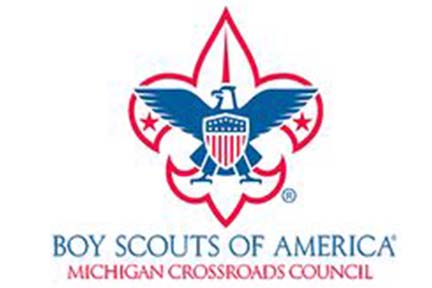
by Becky Andrus | Oct 11, 2021 | Scouting
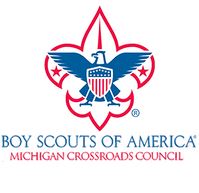
Brandon Kathman
District Executive
Brandon.Kathman@scouting.org
947-886-5736
Local Scouts experience spike in membership
Scouting’s local Pontiac-Manito District has experienced a large increase in membership this fall, with registered youth increasing by 27% over the beginning of the year.
According to the district, which spans much of Oakland County, the sudden growth suggests a reversal of the negative trends experienced by many extracurriculars during the pandemic. With around 850 active participants, Pontiac-Manito is one of the larger districts in Michigan.
“I think everyone’s ready to get outside again,” Cathy Cowger, a volunteer commissioner for Scouting in White Lake and Waterford, said. “I think this program offers them an opportunity to do that.”
Much of the increase is concentrated within the Cub Scouts program, which serves boys and girls from kindergarten through fifth grade. Cubmaster Eric Stevens of Pack 59 in Lake Orion said he watched his unit more than double in size during the fall.
“Through a very difficult year, Scouting continues to be a great value to the families in our area,” Stevens said. “Our growth in membership proves that the fundamentals of our program remain relevant and exciting for everyone involved.”
While most new registrants have signed up for the Cub Scouts, the district’s Scouts BSA program for middle and high schoolers boasts one of the highest retention rates in the country at over 95%. In August, youth representatives from across the region gathered for a “Youth Leaders Membership Summit,” which laid some of the groundwork for the fall membership drive. This included an initiative to support Cub Scout packs and their programs, bolstering retention and crossover rates.
The newly recruited cubs will have the opportunity to experience their first scout trip at Camp Agawam in Orion Township later this month. The district’s Fall Camporee will include a “Cub Fun Day” on October 23 from 1:00 to 5:00 p.m., featuring archery, field games and a robotics demonstration. The event is open to the public, and families from the community may attend and experience Scouting at no charge.
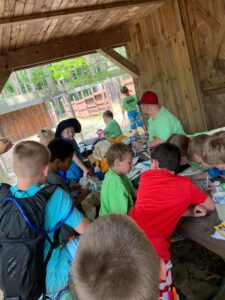
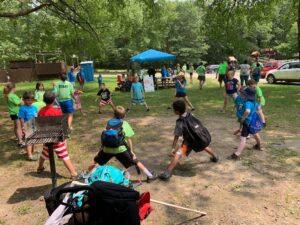

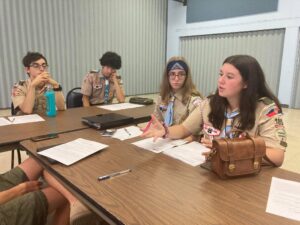
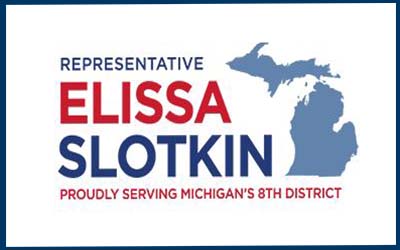
by Becky Andrus | Oct 7, 2021 | Regional News
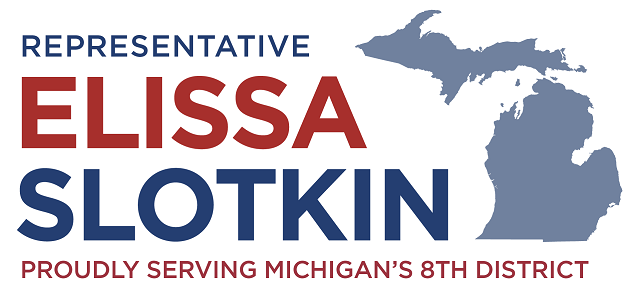 |
|
|
| Hi there,
Even though I didn’t get to drive a big piece of equipment this time, we had a *busy* day in Howell talking about strategic investment in Michigan’s roads, bridges, rural broadband and clean, safe drinking water with Local Operating Engineers 324 and President Biden.
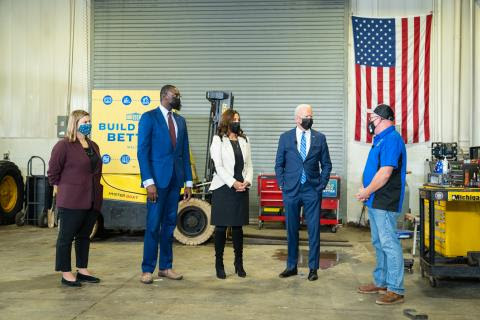
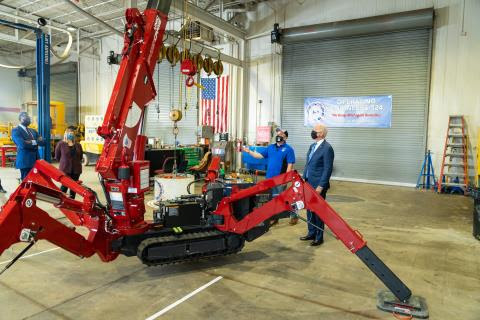
There was no better place to talk about infrastructure and I’m glad that the President was able to come to Howell and meet some of the actual workers who will be on the front lines repairing our bridges, and rebuilding our roads and dams.
Michigan badly needs a generational investment in our infrastructure. There is no such thing as infrastructure problems in only blue areas or red areas. We all need safe roads for our families to drive on; we all need pipes and water supplies that give our kids clean drinking water and we all need access to broadband so our students and small businesses are set up for success.
In the ride from Lansing airport, I was frank with the President that my highest priority is making sure the bipartisan infrastructure bill becomes law. Getting this bill signed will be hugely impactful for Michigan infrastructure, and it will create millions of good-paying union jobs.
This bipartisan infrastructure bill would:
Repair our road and bridges
- Michigan would receive more than $7.3 billion for repairing highways and more than $563 million for bridges.
Making sure Michigan families have clean, safe drinking water
- Included in this bill is $1.3 billion for Michigan’s water infrastructure, including replacing lead water pipes that are making people sick, and cleaning up contamination from PFAS and other toxic forever chemicals.
Help Michigan lead the transition to electric vehicles
- It also includes $110 million to build electric vehicle charging stations across our state. This investment will reduce carbon emissions, support manufacturing jobs at auto plants like GM’s factory in Lake Orion, and position Michigan as a national leader in the manufacturing of electric vehicles.
Expand access to broadband
- Michigan would receive over $100 million to help expand high-speed broadband coverage, especially to our rural communities, especially to areas like Livingston County, where the Southeast Michigan Council of Governments reports that roughly one in 10 households don’t have access to reliable internet right now.
Here in Michigan we have the facilities, the equipment, and the skilled workforce to rebuild our infrastructure for the 21st Century. I also talked to the President about the need to expand access to affordable child care for working families and letting Medicare negotiate for lower drug prices. I was candid that when it comes to the Build Back Better Act, the bill needs to be both transformative and targeted to earn my vote. It has to be fully paid for so that it doesn’t pass on more debt to our kids or saddle working class families with the bill.
As I told everyone in Howell, we’ve talked about the challenges in infrastructure for a long time and had more infrastructure weeks than we can count, but we need more than talk. We need action and we have the real opportunity to do something about it in a bipartisan way.
-Rep. Elissa Slotkin |
|















